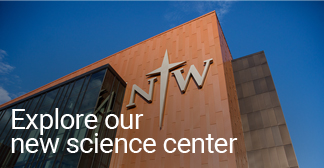Secondary Endorsement in Basic Science
This endorsement leads to licensure to teach general science, physical science, basic integrated science and middle school science. This endorsement requires completion of majors in secondary education and in a science specific content area (biology or chemistry).
Requirements
NSC 308 - Methods of Teaching Secondary Natural Science
(3 credits, alternate years, consult department) A study of the techniques and materials for teaching natural science at
the secondary school level (for biology and chemistry majors). This course requires a 30-hour practicum and is required of each candidate seeking an endorsement in this content area. Prerequisite: upperclassman.
Notes: Credit does not count toward the major or minor. See course offerings under biology, chemistry and physics.
Earth/Space Science (6-8 credits)
NSC 101 - Introduction to Earth Science
(4 credits, alternate years, consult department) An introduction to an understanding of Earth?s geological, hydrological, atmospheric, and environmental systems, the impact of human activity on such systems, and the ethical basis and strategies for human response to environmental degradation. Course includes required field trips and 90 minutes of lab per week.
Note: This course is restricted to students pursuing a Middle School endorsement. Students may NOT receive credit for both BIO101SN and NSC101. A fee is associated with this course.
PHY 160SN - Astronomy
(4 credits) (NWCore option under Science and the Natural World) This course covers several topics in the field of astronomy chosen from our solar system, stellar lifecycle, astronomical observations and measurements, and a basic introduction to cosmology and relativity. The basic tools, concepts, physics, and mathematical models in astronomy are discussed. Students are expected to be able to articulate a Christian perspective on our place in the universe. Prerequisite: C- or higher in either MAT109QR or MAT127, or ACT math score of 22 or above (SAT 550 or above) or permission of instructor.
Note: There is a laboratory/observation component to this course.
Life Science/Biology (6-8 credits)
BIO 115SN - General Biology: Molecular and Cellular Biology
(4 credits) (NWCore option under Science and the Natural World) An introduction to molecular and cellular biology, with an examination of the processes common to living organisms and an introduction to the diversity of life, emphasizing unicellular organisms. This introduction will provide students with a basic understanding of macromolecules, cell structure and function, respiration and photosynthesis, the cell cycle, meiosis, genetics, mechanisms of evolutionary change, and Christian perspectives on evolutionary biology. Prerequisite: Combined Math + Science ACT of at least 44, sophomore standing, or permission of instructor.
Note: Three lectures and 3 hours of laboratory work per week. A fee is associated with this course.
BIO 116 - General Biology: Ecology and Organismal Biology
(4 credits) An introduction to organismal biology and ecology. Structure and function of representatives from the plant and animal kingdom are emphasized. In addition, students will be introduced to basic ecological concepts and Christian perspectives on stewardship.
Note: Three lectures and 3 hours of laboratory work per week. A fee is associated with this course.
Physical Science (6-8 credits)
PHY 111SN - General Physics I
(4 credits) (NWCore option under Science and the Natural World) This is the first in a two-course algebra-based sequence. Topics include kinematics, Newtonian mechanics, energy, momentum, gravity, atomic physics, thermodynamics, and simple harmonic oscillations. Prerequisite: C- or higher in MAT109QR, ACT math score of 24 or better (SAT 570 or above), or consent
of the department chair.
Note: There is a laboratory component to this course.
PHY 112 - General Physics II
(4 credits) This is the second in a two-course algebra-based sequence. Topics include electricity, magnetism, electromagnetic waves, electromagnetism, and optics. Prerequisite: successful completion of PHY111SN with a grade of C- or better,
or consent of department chair.
Note: There is a laboratory component to this course.
Chemistry (6-8 credits)
CHE 101SN - College Chemistry
(4 credits) (NWCore option under Science and the Natural World) This course is an introduction to inorganic chemistry, with an emphasis on the health sciences. It is well suited for students whose programs require one year of chemistry.
Note: Three lectures and one three-hour laboratory period per week. Open to all students. A fee is associated with this course.
CHE 102 - College Chemistry
(4 credits) An introductory course in organic and biological chemistry. The content is especially suited to meet the needs of students whose programs require only one year of chemistry. Prerequisite: CHE101SN.
Note: Three lectures and one three-hour laboratory period per week. A fee is associated with this course.
Total credits required: 28-36

